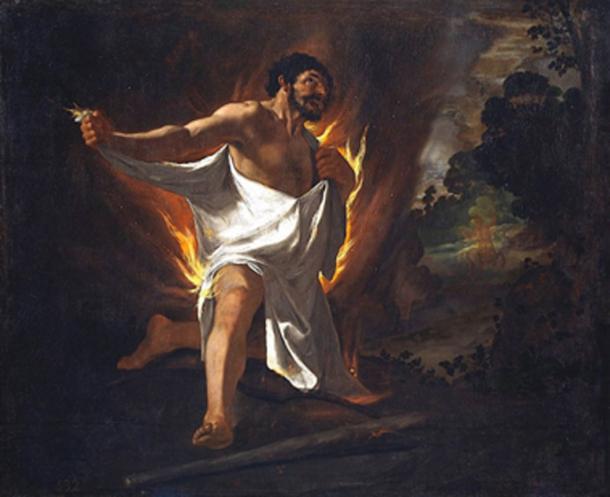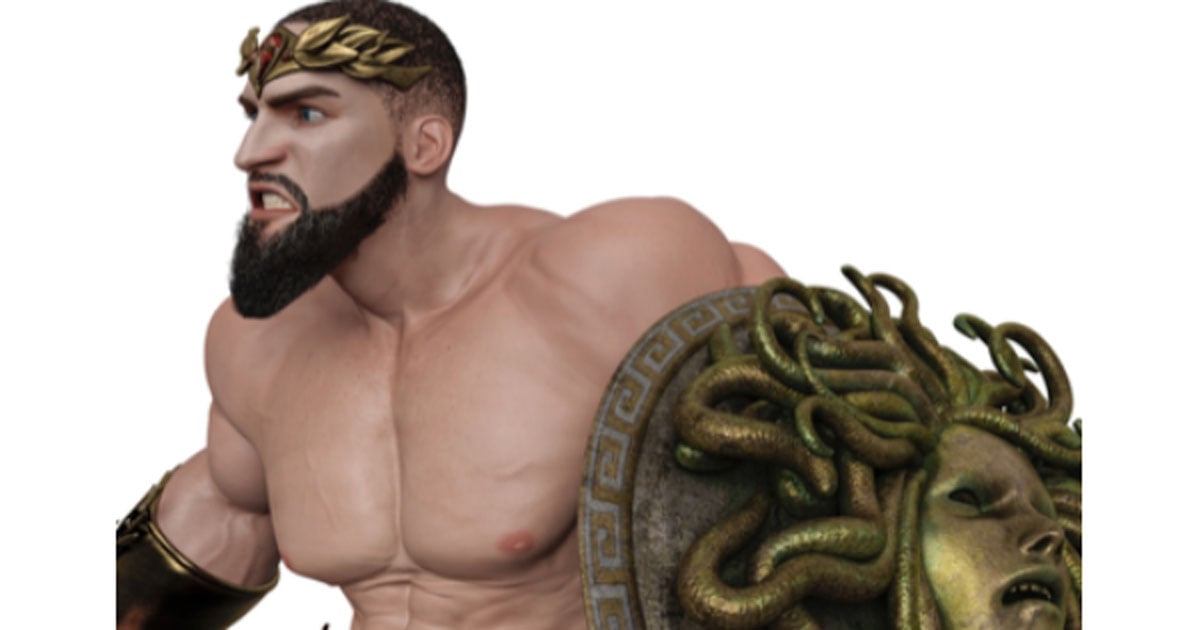My Name Is Heracles, And I Have Father Issues
The story of Heracles is considered one of the oldest of the Greek myths. Heracles’ popularity stretched from the western world to the far reaches of northern India. His likeness has appeared as Vajrapani, next to Guatama Buddha in Gandhara. He was loved by the Romans, who adopted him as Hercules for their literature and art.
There is no end of television shows, movies, and merchandise that carries his name. And his story will likely be taught in schools of the future. But what makes this mythic hero so fascinating? How is it that Heracles continues to inspire and captivate audiences all over the world?
After all, if one were to place a modern light on the age-old tale, Heracles himself would appear very troubled. He was the result of the rape of Alcmene by Zeus, something which Heracles’ stepfather Amphitryon never let him forget. Nor did the jealous wife of Zeus, Hera, who tormented him since the day of his birth.
He was tried for murder at a very young age, he killed his wife and all eight of his children, he strangled an Amazon queen for her girdle, he killed a prince, and he acted as an assassin to whoever would house him. With everything mentioned, he should be perceived as a terribly troubled and unlikeable person.
But there was another side to him which was more human than god. Heracles was very passionate and emotional. He would do great deeds for those he loved, and he would do bad and horrible things to those who crossed him. Could the real reason why the world loves him be because of his tragic flaws, his immense guilt, and his constant pursuit of redemption?
Hera, Zeus, and the Infant Heracles
To truly understand the torments Heracles endured, one must know of the turbulent marriage between Zeus and Hera. The love of Zeus and Hera was both intense and incestuous.
From early on, their games of flirtation consisted of charm and excitement. However, as with all passionate romances, Hera couldn’t bring herself to see that she was in love with an adulterer.
With that love came jealousy that was ever more powerful, one which Hera herself could not endure. But it was one which kept her from turning against the real culprit, her husband. Instead, she spent her entire life tormenting those who were the illegitimate offspring of Zeus. One of the most famous who suffered from Hera was Heracles.
The Early Life of Heracles and His Two Fathers
Heracles had two fathers. Zeus was the father who conceived him, but Amphitryon was the father who raised him. How did this come to be is a tale of trauma, rape, and forgiveness?
During King Amphitryon’s expedition against the Taphians and Teleboans, Zeus disguised himself as the king and slept with Alcmene (who was technically Zeus’s great, great, granddaughter) for three whole days. By the end of the third day, Heracles was conceived.
When Amphitryon returned home, the blind prophet Tiresias told the king what Zeus had done. When a powerful king is faced with the rape of his beloved, one could imagine nothing but rage and a need for vengeance. However, when the perpetrator is the powerful god of gods, that anger becomes replaced with questions of faith and tolerance, especially if that rape bore an innocent child.

The birth of Heracles. (Dodo / Public Domain)
Amphitryon’s dynamic with Heracles must have been a difficult challenge of balancing paternal love with resentment in raising another's child. To imagine if Heracles was born to King Amphitryon and his wife Alcmene rather than to have been the offspring of Zeus, Heracles’ life would have been one of royalty, privilege, and happiness. But alas, it was not the case, and Heracles’ life was spent on the run and in hiding from the most vengeful of gods: Zeus’s betrayed wife, Hera.
Heracles’ relationship with Hera was a constant torment. Her anger was so strong that it bestowed a madness into the psyche of Heracles. Heracles’ torments were said to have begun when Amphitryon’s servants tried to hide him, only to be mistaken as an orphan child by Athena and brought to Hera. Hera, being told by Athena to breastfeed this child, did so.
Why anyone would wish to breastfeed a random child from the woods, and why a vengeful woman such as Hera would not recognize Heracles after spending much time trying to kill him, remain questions for future scholars to answer. When Heracles’ mouth was placed over the nipples of Hera, Heracles bit down and hurt her, forcing her to flinch and to spray her breast milk over the evening sky, thus creating the Milky Way.

The Milky Way was created when Hera breastfeed Heracles. (Alonso de Mendoza / Public Domain)
Heracles spent the early part of his life in the court of Amphitryon. Though he was not his son, Heracles was still treated like one. Heracles had the best tutors in the Greek martial arts, horseback riding, archery, chariot driving, music lessons, and singing. As he grew, it was revealed that he was very good at the Greek martial arts. However, what no one realized was that his physical strength was growing as well.
Heracles on the Run
The first instance of his strength becoming a mishap was when he was tried for murder in his father’s court. As the story goes, Heracles accidentally killed his tutor Linus due to his frustration in not being able to play the lyre.
Being that he was the son of Amphitryon, the Greek court acquitted him as innocent, stating that it was ‘self-defense’. Being that this did not sit well, Amphitryon and Heracles ran away to start a new life raising cattle in an unknown location.
Whether the accounts are true or not, it was written that two figures by the name of Vice and Virtue approached Heracles while he herded goats on a mountain. Both asked him whether he wanted a comfortable life with no fame, or to be continued in his torments and to find glory at the end of his life.
It was said that he chose glory. Given the experience which Heracles gained until this moment, it would be surprising that anyone would choose a tormented life since he already was living one. He did but regretted that choice for the rest of his life.
- A Match Made in Greek Legend: What Happened When Heracles Met the Snake Woman?
- Baby, Baby, Baby: Why Did the Ancient Greeks Turn Dead Children into Heroes?
- Heracles and the Mares of Diomedes: Greek Hero VS Man-Eating Beasts

The choice of Heracles. (Chick Bowen / Public Domain)
By the time Heracles was 19 years old, he had gained better control over his abilities and was able to use them effectively. His first task was given to him by King Thespius of Thespiae to kill the Lion of Mount Cithaeron. Within hunting the beast for 50 days he vanquished it and dressed himself in the lion’s skin.
King Thespius was impressed by Heracles’ ability to kill the lion but was more impressed with his superhuman strength. Because of this Thespius hoped to have heirs who would carry this strength and he ordered that Heracles bed 50 of his daughters so they could bear strong children.
Heracles impregnated them all. His offspring would go on to become the Heraclids of later (descendants of Heracles). Though things seemed positive, it would be his own madness that would destroy everything he loved. The more greatness he achieved, the more tragedy he feared.
Creon, the Theban king, was fascinated by Heracles and wished for his daughter Megara to marry him. Of all the records, his relationship with Megara was one of his most cherished for they bore eight children together and began a good and happy life.
However, one could assume that in the back of Heracles' mind, there must have been a looming fear of what would come to destroy this. After all, when he faced both Vice and Virtue on that mountain top, Heracles chose tragedy and glory rather than simple and happy.
With the stress brought on from what he suspected, and from the madness brought on from Hera, Heracles went mad and killed his entire family. Awakening from the madness, Heracles wept for he knew he killed his only sense of happiness.
And so, when he was a younger man, Heracles was no longer a hero, but a murderer on the run. One could only imagine the guilt he felt.
He headed to Tiryns in order to lay low. There, King Eurystheus gave Heracles a deal: "Your sins and reputation can be restored, but you will have to do these twelve labors”.

Roman relief depicting the sequence of the labors of Hercules. (Jastrow / Public Domain)
Heracles Near the End
Heracles did the twelve labors. All of which he did to the best of his abilities. Heracles was now free.
However, Heracles would endure further troubles with his uncontrollable madness when one day he killed Prince Iphitus of Oechalia. He would then be told by the oracles that he was to be a slave. He became the slave of Queen Omphale of Lydia, who took him as her lover and eventually set him free.

Heracles and Omphale. (Aavindraa / Public Domain)
Heracles married again, to Deianira, and both moved to Calydon until his madness took hold again and he killed his father in law's cupbearer. This act was forgiven by the king for he saw it as an accident. Though Heracles still suffered from these killing spells of madness, he seemed to be able to handle it better in his later years.
After a few more adventures, Heracles and Deianira settled down in the city of Trachis where they started a family. Heracles would then take on a concubine by the name of Iole. Further drama ensued when Deianira feared that her husband was growing fonder of Iole.
Deianira soaked a shirt in the blood of Nessus and then washed away the stains, only leaving the poison exposed but invisible on the surface. When Heracles put on this shirt he died a slow and agonizing death. His last thoughts may have been back at the mountain top with Vice and Virtue or perhaps he wondered if Hera was finally content.
- Ancient Egyptian City of Heracleion - on the border between myth and reality
- The Three Fates: Destiny’s Deities of Ancient Greece and Rome
- Rekindling of the Hearth of Hellenism - A Return to Worship of the Greek Gods

Death of Hercules, painting by Francisco de Zurbarán. (Alonso de Mendoza / Public Domain)
The Insanity and Analysis of Heracles
Although the outlines of his character existed in figures and depictions above Olympian temples, his character was quite fluid, giving artists through the ages flexibility for their needs in his portrayals. Whether he existed or not, it seems his legacy remains supreme.
Unlike most other Greek heroes, there are no tombs which are associated with him. What is known is that his legend was most likely near eastern and Turkish and may have been an inspired variation of the Epic of Gilgamesh.
Most of what we know comes from Euripides and other Athenian playwrights from 444-446 BC. Many popular stories were told of Heracles’ life, one of the most famous was of the Twelve Labors of Heracles.
During the Hellenistic age, Alexandrian poets would reframe his stories into epic poems of tragedy. Whether he was a real person at one point or whether he was a myth is still in scholarly discussions, for many civilizations have claimed to be descendants of him such as the Spartans and Alexander the Great.

The Heracles Papyrus, a fragment of a 3rd-century Greek manuscript of a poem about the labors of Heracles. (Denniss / Public Domain)
The insight explored regarding Heracles’ madness was that his actions, though brought on by Hera's wrath, might have, in fact, been a panicked refusal to live a simple life. According to the works of Euripides, it was indicated that he preferred the extreme violence of the heroic life than any other.
The current myth of the madness of Heracles was primarily made popular from the Athenian playwright Euripides in 424 BC. Later versions of plays, from 444 - 446 BC, added further alterations to the theme of Heracles’ madness. The writers of that time became more fascinated by his irrational behavior and saw it as a beautiful flaw to counter the majestic strength and masculine perfection which he bestowed.
It is also believed that the alterations to Heracles’ story had to do with the Melos Island revolt incident during the Peloponnesian War in 416 BC. Citizens of the island were invaded by Athens. Athens crushed the uprising and killed every male in Melos.
The Melos children and women were enslaved, and Melos was left annihilated. The idea of Heracles murdering his wife and children might have been a political reference to the violent actions Athens, which had prided itself on being a just and logical place, took on Melos island.
Heracles as Vajrapani
Hellenistic Greek art first spread into Gandhara from the conquest of Alexander the Great. (335-323 BC). This created a culture known as the Greco-Bactrian kingdom, which was the fusion of both Eastern Indian and Greek culture. With this fusion came the artform known as Greco-Buddhist art. In this fusion, a unique depiction of Heracles acting as Buddha's protector was created. However, though he may appear the same, his name and likeness were used to represent someone else: Vajrapani.
According to scholar Katsumi Tanabe, the physical type of Vajrapani was fundamentally derived from that of Heracles. However, he states, that there has been no scholar who has been able to give a convincing explanation to why Heracles was preferred over any of the other Greek deities by Gandharan sculptures.
Though Vajrapani existed before Heracles, their traits paralleled. Therefore, one possible reason was that the stories of Vajrapani, being a troubled war deity, took it upon himself to protect and guide Guatama Buddha, which might have seemed just like a deed that Heracles would do. Therefore, they would be interchangeable in the mind of the Greco-Bactrians. But, as Tanabe stated, no scholar is sure.
Though it is thought that the origins of Heracles' legend might have been in the Near East, other scholars have stated that his legends were greatly inspired by the Epic of Gilgamesh.

The protector Vajrapani of Buddha is another incarnation of Heracles. (World Imaging / CC BY-SA 3.0)
Closing Thoughts on Heracles
Heracles was essentially a troubled individual who was on the run almost his entire life. He was a killer who served people of power as a mercenary. He suffered from maddening rage which was allegedly caused by Hera.
He died as he lived: in torment and agony, but he is forever remembered. His life was a message to us all, that everything comes at a price, and that happiness must be attained even if it is just for a fleeting moment.
Top image: Heracles the tortured Greek hero. Source: DM7 / Adobe Stock
By B. B. Wagner
References
Bruxton, R. 2004. The Complete World of Greek Mythology. Thames and Hudson.
Bulfinch, T. 1863. Bulfinch’s Mythology. Legends of Charlemagne. [Online] Available at: http://www.online-literature.com/bulfinch/mythology_charlemange/
Bulfinch, T. 1858. Bulfinch’s Mythology. The Age of Chivalry. [Online] Available at: http://www.online-literature.com/bulfinch/mythology_chivalry/
Bulfinch, T. 1855. Bulfinch’s Mythology. The Age of Fable. [Online] Available at: http://www.online-literature.com/bulfinch/mythology_fable/
Campbell, J. 2008. The Hero with a Thousand Faces. New World Library.
Ferguson, A. 2013. Consider the Source: Why was Hercules the Buddha’s first guardian. tricycle. [Online] Available at: https://tricycle.org/trikedaily/consider-source-why-was-hercules-buddhas-first-guardian/
Galinsky, K. Date Unknown. Herakles/Vajrapani, the companion of Buddha. Society for Classical Studies. [Online] Available at: https://classicalstudies.org/annual-meeting/150/abstract/heraklesvajrapani-companion-buddha
GreekBoston. Date Unknown. The Rocky Relationship of Zeus and Hera. Greekboston.com. [Online] Available at: https://www.greekboston.com/culture/mythology/zeus-hera/
Greek Mythology. Date Unknown. Heracles: the Life of the Greek Hero. Greek Mythology.com. [Online] Available at: https://www.greekmythology.com/Myths/Heroes/Heracles/heracles.html
Gregory, J. 1991. Euripides and the Instruction of the Athenians. University of Michigan Press.
Hard, R., translation. 1999. Apollodorus The Library of Greek Mythology. Oxford University.
Homrighausen, J. 2015. When Herakles Followed the Buddha: Power, Protection, and Patronage in Gandharan Art. The Silk Road. [Online] Available at: https://www.academia.edu/11796398/2015_When_Herakles_Followed_the_Buddha_Power_Protection_and_Patronage_in_Gandharan_Buddhist_Art
Licht, H. 1953. Sexual Life in Ancient Greece. [Online] Available at: https://books.google.com.ec/books/about/Sexual_life_in_ancient_Greece.html?id=T044AAAAMAAJ&redir_esc=y
Mark, J. 2014. The Life of Hercules in Myth & Legend. Ancient History Encyclopedia. [Online] Available at: https://www.ancient.eu/article/733/the-life-of-hercules-in-myth--legend/
Powell, B. 1995. Classical Myth. Prentice Hall College Div.
Pomeroy, S., Burstein, S., Donlan, W., Roberts, J., and Tandy, D. 1999. Ancient Greece A Political, Social, and Cultural History. Oxford University Press.
Rune Soup. 2011. When Buddha Met Hercules: The Lessons of Ai Khanum. Rune Soup.com. [Online] Available at: https://runesoup.com/2011/06/when-buddha-met-hercules-the-lessons-of-ai-khanum/
Tanabe, K. 2005 . Why is the Buddha Sakyamuni Accompanied by Hercules/Vajrapani? Farewell to Yaksa-theory. Istituto Italioano per L’africa e l’Oriente (IsIAO).


















Comments
Reading some of the ancient Histories (actually written in ancient times) gives a different perspective on many Greek myths. There are at least TWO Hercules’ mentioned – the Ancient one being Shem Melchizedek the son of Noah and called “the Great King” in several accounts, and the other being Nimrod (King of Babel NOT Babylon). Nimrod was known by other names in different cultures, such as Thor, Osiris and Krishna.
Which all makes for confusing nonsense...... unless one has the key to unlock the meaning of the story. Currently academics do not but some do have the key and the story makes sense.
Alice through the looking glass is total nonsense unless one has the key and the key in this case is Amanita Muscaria. If you should want the key then contact me at guillaume icon.co.za
I do have the key to the story of Hercules but I cannot reveal it as the times are not right for acceptance but the time will come, soon